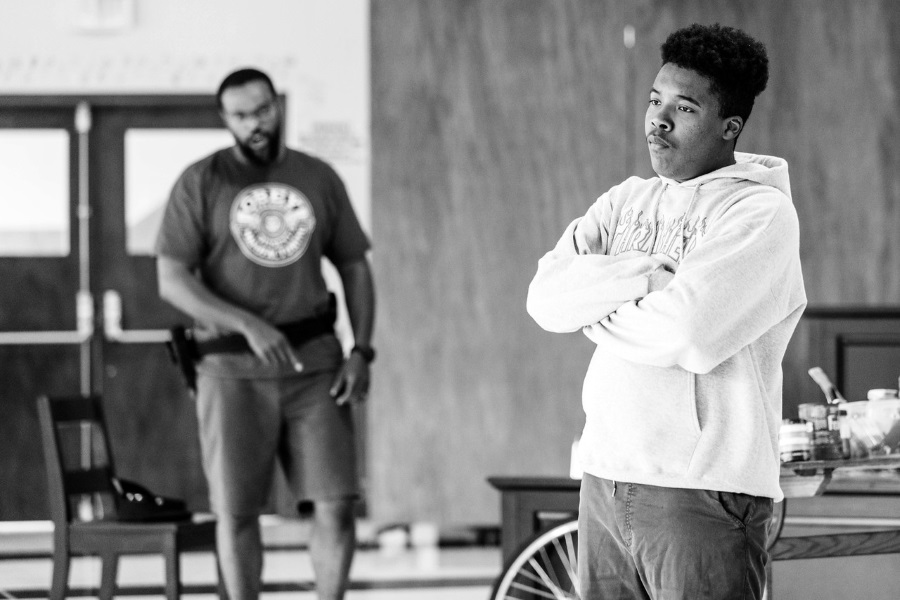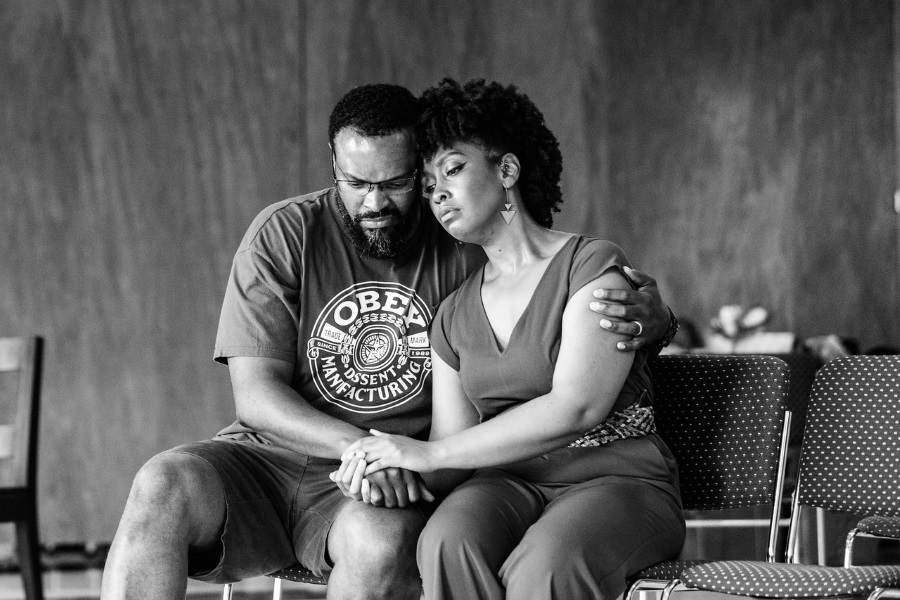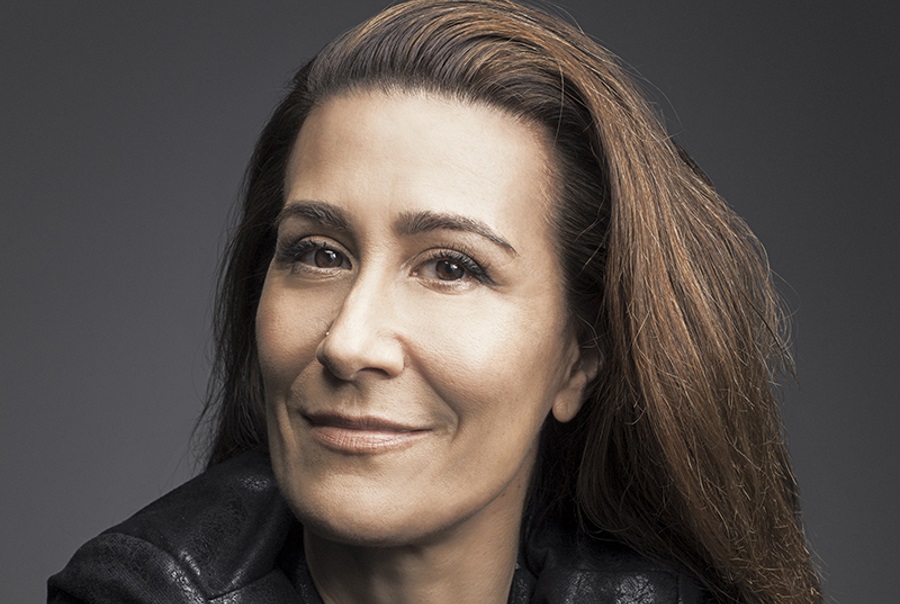Jeanine Tesori seems to like having an office. In the three times I’ve had the pleasure of interviewing the composer of Fun Home and Caroline, or Change, I’ve always met her at her latest work home: first at a studio in upper Midtown, appropriately enough near the old Brill Building, which she shared with the visionary Baptist composer/arranger Buryl Red; next in hip digs in Midtown East; and most recently in an office at the back of City Center, where she’s had an artistic home of sorts for years as artistic director of the summer Encores! Off Center. (She’s still an artistic advisor there to the series’ leader, Anne Kauffman, and to the larger Encores! program as well.)
The occasion for our recent visit was the premiere of Blue, her first full-length opera, which she wrote with director/playwright Tazewell Thompson and which runs at Glimmerglass Festival in Cooperstown, N.Y., July 14-Aug. 22 (it will also play next season at Chicago Shakespeare Theater). A comic/tragic look at an African American family torn apart by police violence, it’s an original piece commissioned and directed by Glimmerglass artistic and general director Francesca Zambello.
This is a busy time for the versatile, dynamic Tesori, who has shown herself equally adept at musical adaptations (Shrek, Thoroughly Modern Millie, Fun Home) as originals (Violet, Caroline). Another original musical, Soft Power, this one created with playwright David Henry Hwang, will open at the Public Theater in September.
In a free-ranging conversation, we spoke about music, theatre, and the “gray zone” where opera and theatre are sometimes meeting in interesting new ways.
ROB WEINERT-KENDT: I read a little from Tazewell Thompson about how he came up with the idea for Blue, looking at the difficulties of raising Black boys in America. Is it true that making the father in the family a cop was your idea?
JEANINE TESORI: Yes.
Why did you suggest that? Did you feel it brought the conflicts in the piece more to the surface?
I do a lot of activism inside the arts community for social justice, and at that point I was doing a lot at the Columbia Law School with the Broadway Advocacy Coalition. We did a gigantic concert a couple years ago, and I met a ton of people. Out of that I met a Black police commissioner, and the idea about the “blue line” for people of color in uniform—not that it’s one story, but their specific stories—I was saying to Tazewell that I’ve not seen that story before, of an officer of the law who is also part of the community, and what happens to them when they’re not in uniform. To me the opera’s about being part of the solution and part of the problem. For me the church is exactly that too: I was raised a Roman Catholic, and the Roman Catholic Church is part of the solution and part of the problem. They have created as much heartache as they have saved.
Tazewell had a very, very energetic reaction, “No,” when I suggested the father be a cop, because he will describe himself as a very dark-skinned African American man, and he’s been stopped and frisked, harassed; his stories are really hard to hear. But then the next day he said, “It’s very scary for me. And I want to do that.” We were off and running after that.
A lot of artists say they find that energizing—that when they know they’re scared of something, that’s an arrow telling them where they should go. Does that guide your choices as well?
Everything I do scares me. Writing scares me: I won’t finish it! It’s so much easier not to write, and wonder about what it would have been: “It would have been so great! It would have just knocked everyone’s socks off!”
This is billed as your first full-length opera, but you’ve done shorter operas before, right?
This is the third piece Francesca Zambello has commissioned from me. There was the Eugene O’Neill opera with Tony Kushner, A Blizzard on Marblehead Neck, and The Lion and Unicorn and Me, based on the Jeanette Winterson’s book, and that was with J.D. McClatchy. For this one she just said, “I want a really political opera.” She knew that my appetite was for complicated issues, and trying to find out what’s dangling at the end of them. Tazewell and I started from nothing.
I’m always curious how a composer gets from the story to the sound of a piece. How did you find that in this case?
I knew that I was writing it for a 47-piece orchestra. I wanted it to have some new music, but some of the style of—not a folk opera, exactly, but of real people, of what they sound like to me. What do men sound like in a sports bar? The world is operatic to me, in the way that you can hear counterpoint, and you can hear when something soars above it. Maybe it’s the Sicilian roots—I feel like it’s in my blood, my grandfather being a composer.
I didn’t know that. What kind of music did he write?
He wrote band music. He played the viola, which I forgive him for—I’m just kidding. I have his arrangements. We never met.
You’ve heard his pieces or no?
No, but I have his music. A lot of them are studies, etudes.
Okay, so it’s in your blood. So you feel like opera…
Yeah, I feel there’s a pull to the epic story, and to people I feel have maybe not gotten equal time downstage center. I’m really interested in that, in seeing people have agency. What this ended up being was more Greek than I thought it would, because I don’t know that a Black man in this country doesn’t have his fate somewhat sealed, in the way that the Fates spin the thread out and one cuts that—it occurred to me how Greek that was. Also how epic that was, and how the proscenium might reveal that and make us wonder.

It’s funny that you said folk opera, because what I’ve heard of the opera reminds me very much—and I felt this about some of Fun Home too—like mid-20th-century classicism, when composers like Weill or Britten or Bernstein were trying to create a new popular opera. Do you know what I’m talking about?
Yes, I do. I love Kurt Weill, Britten, William Bolcom.
And Barber.
Barber, yeah.
It’s not that they didn’t write music that was spiky or dissonant, but their work was still tuneful.
Yeah, I am a melodist, and I also really love dissonance in terms of the tension and relief, so you understand the consonance, the foil and the release of it. In terms of the choral work, I didn’t want to write for a Baptist choir. I wanted to write true choral music.
Which circles back to the influence of Buryl Red, one of your mentors.
Oh, deeply. He wrote for gospel choir, but also he and I did so much choral work together. Buryl was a student of Elliott Carter, but his openness to all music—still to this day, he is the youngest musician I’ve ever known. He did not judge, did not compete, was not interested in the bullshit of who gets what and the gold shiny things. It did not interest him. He wanted to know what people were writing and why they were writing it. And it was absolutely contagious, his love.
From what I’ve read, he didn’t seem to care very much about genre definitions.
He didn’t give even one shit about it. We would go to jazz; we went to every piece of the Stravinsky when it was done years ago. And then my friend John Clancy, who orchestrated Fun Home and is now orchestrating a lot, was one of the last students of Buryl’s, and he had a punk band, and there was Buryl: “Clancy, I have note about the song ‘I Want to Vomit Blood.’”
Speaking of genre definitions, I know some folks think of Caroline, or Change as an opera because it’s sung-through.
It’s a thopera.
A what?
Thopera—a theatre opera.
That’s a new one to me. But that show fits into a musical theatre frame, in a way.
In a way.
Because it’s really the kind of voices that are different, right?
Yeah. I think the labels are different sometimes; there are nooks and crannies. I’m really enjoying what Beth Morrison is doing with the Prototype festival, because more and more people are doing opera-theatre or theatre-opera, and asking audiences to just go on a journey and not worry about it as much, pushing against the definition of it. Which I really, really love.
Still, when you hear opera, it’s like with Shakespeare—it takes a minute for your ear to adjust to the language. Do you know what I mean?
I do. I think the beauty’s in the gray zone. Look at Sweeney Todd, which is a masterpiece. For me Sweeney Todd is operatic in its pursuit, but is made for the theatrical voice. You know, we have the greatest theatre actors and singers, but more and more opera singers I work with are also great actors. So it’s getting all mushy, which I really like.
The other thing about works like Sweeney or Caroline is that they’re operatic in their scope and their feeling and some of their form, but the songs still move like theatre songs: They have a beginning, middle, and end. I don’t know Blue that well, but opera is a realm where there tend to be repeated lines, and arias tend to hold a moment rather than move forward.
Absolutely true, and it’s true for this. There’s not a lot of song form, there’s not a lot of ritornello in this. Because with opera you can just go: I want to repeat. In theatre I don’t get to repeat that much; I don’t get to say, “The orchestra plays here for 32 measures.” In theatre that doesn’t happen unless it’s dancing. Here it’s just in the nature of the form to allow the proscenium to sing, to allow the whole thing to breath, and I love that.
Right, choreographers get dance breaks and long dance arrangements, but musical theatre composers don’t get a lot of instrumental passages to do whatever they want. Here you have a chance to stretch out musically and vocally.
I think generally in opera—again, I bristle a bit at definitions, but the discussion is really fun—the idea is that the music leads, rather than the text. In theatre generally I would say the text leads. Yet even in opera, for me, the story is so important. I want people to be uplifted by the first act, and then understand that Blue is really about the possibility denied. And that we must look at certain people born in this country for whom possibility—it’s in the cards that the possibility is denied.

Do you write at the piano? Or do you try and stay away from it until your ideas are fully formed?
I do both. I write a lot away from the piano now, so when I get to the piano, it’s been swirling around.
And you’re still working with an instrument, rather than with programs or things like that?
I do not work at all on the computer. I had my time with the computer. I was the MIDI generation; all through the mid-’80s and all through the ’90s, I was doing everything MIDI. So if I see a keyboard now I literally recoil. Now I write everything out by hand.
Regarding the style, did you feel at any point that you wanted to incorporate African American musical styles into the score? Or have you tried not to think of that consciously?
I’m trying to think about the characters and what I think they sound like. I think about and live with these characters to a certain extent. It isn’t through a determined filter; I try to write the heartache as I can experience it myself, the way I hear it, and trying to translate it through this character. I am a visitor in the story. I am a listener in the story. It’s complicated that I’m writing this story.
Obviously in Caroline, or Change there are definitely idiomatic elements.
Much more.
And in Fun Home the commercial jingle—in other words, songs that sound like the kind of music the characters would listen to, that they would hear in their world.
For me this is really modern. This piece is happening now, and so it’s not stuck in anything except a modern urban family. And the way that they go to church, it’s not a Baptist church. I did not want to write for those moments. It’s really for the solemnity and for the plea to God for deliverance.
Musically it seems, like I said, to hark back to the mid-century American opera style. I don’t want to say abstract, but it’s abstracted from the sounds of our everyday life. It’s not like what’s on the radio or in a pop form.
I think that’s a great way to put it. Yes.
What are you listening to these days? Or are you the kind of musician who doesn’t listen to music recreationally?
I do now. I never used to, and then I got my Bose noise-canceling headphones, and my playlist is so crazy. I go through stages where I deeply go in through the works of one person. So I went through a really big K-hole for Bob Dylan, I went all the way down. I listened to “Positively 4th Street” about 30 times on repeat one day. I’m also in a big Michael Friedman phase. I’ve listened to Gone Missing incessantly. And then there are certain pieces that I’ve always really loved: I listen to Bartok a lot, and Stravinsky. I love Edie Brickell; I love people I feel a lot of strength from. Chrissie Hynde has always been big for me. Indigo Girls.
This was a surprisingly interesting season on Broadway. Did you feel that?
I love how many women are writing.
But not enough.
Not enough, but more. I guess I’m coming from the bar being pretty low. I see Shaina Taub out there, and I know that Cyndi Lauper is working on another and Sara Bareilles is out there.
You have more colleagues than you used to, that’s for sure.
And they’re great, they’re great writers. I’m on the West Side Story movie—I’m the vocal producer, so I haven’t had a lot of time to see much.
Wow, can you say anything about that project?
I can’t.
But you’re happy with it?
I am. I really want to make an original movie musical, and so watching this one take shape, I really have learned a tremendous amount. I feel like I’m bringing everything that I know to it, but in return I’m learning so much.
So wait, it’s an ambition of yours to make an original movie musical?
Someday. I really, really want to. Not a big one, just a really small one. I have little ideas for it. I used to do them. In the ’80s I was in L.A. when everyone was doing “Cop Rock,” and I worked on the pilot of something called “Shangri-La Plaza” that didn’t quite make it.
I feel like that resurgence was ahead of its time. Musicals are big business again, not just onstage but on screen.
Right, and you see people on their screens lip syncing or singing; it’s become more of an everyday. It’s not as unusual.
Blue will also go to Chicago Shakes, is that right?
Yeah. I have to reduce the orchestra; I’m not quite sure how that will happen, but it will happen.
But you have an orchestrator to help you with that, right?
I orchestrated this.
You did?
Yes. You have to orchestrate your own opera. But I’m very slow.
You don’t conduct anymore, do you?
No, I used to. That’s how I started out. I conducted Blizzard. The orchestra was really kind, but I’m not that great. I can do it, but I don’t think people would want me to, frankly.
A lot of your conducting in theatre was from the piano, right?
Yes. I did a lot of stand-up conducting. I eventually did some symphony stuff but it’s not my thing.
What was your favorite show to conduct?
Tommy. I loved that show. I learned so much watching that come together. I was there that first meeting and I still have the first paper that Des McAnuff gave me where he said, “And then the chair flies.” I thought, That will never work. Conducting the first act of that show is an absolute lesson in the rhythm of a first act. It is what I love about being in the mail room of an orchestra, in a way: You learn from underneath, how something is built. And then you eventually get out, but you never forget what it was like to play it or conduct it.
But you always have that in your mind when you’re writing for it.
Always.


